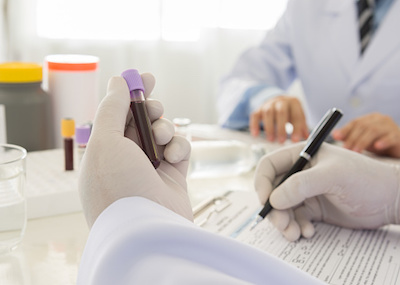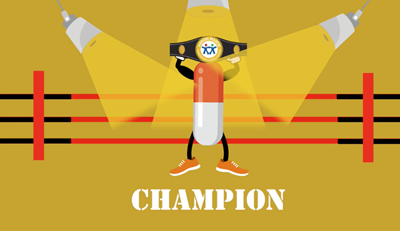How clinical trials make a difference in the lives of kids with cancer
This September is Pediatric Cancer Awareness Month. To truly understand how important this awareness month is to all pediatric oncology patients and their families, it’s important to recognize some of the key statistics regarding pediatric cancer.
- After accidents, cancer is the second leading cause of death in children ages one to 14.
- About 1,250 children younger than 15 years old died from cancer in 2016.
- On average, pediatric hospitalizations for cancer cost almost five times as much as hospitalizations for other pediatric conditions.
- Prostate cancer (patient average age at diagnosis, 66 years), receives more research funding from the National Cancer Institute than all childhood cancers combined.
 A clinical trial is a research study designed to test a specific medical treatment or intervention in people to determine whether it is safe and effective. Before a treatment for cancer or any other ailment can be approved by the Food and Drug Administration (FDA) and recommended for widespread use, it must undergo extensive testing. Often these approval processes take years and cost millions of dollars to complete. Furthermore, if there is a new drug that has been shown to help children with cancer, researchers will then study how the standard treatment compares to the new treatment to determine the most effective way to attack the disease.
A clinical trial is a research study designed to test a specific medical treatment or intervention in people to determine whether it is safe and effective. Before a treatment for cancer or any other ailment can be approved by the Food and Drug Administration (FDA) and recommended for widespread use, it must undergo extensive testing. Often these approval processes take years and cost millions of dollars to complete. Furthermore, if there is a new drug that has been shown to help children with cancer, researchers will then study how the standard treatment compares to the new treatment to determine the most effective way to attack the disease.
Why are clinical trials important?
Over the last 40 years, the number of deaths occurring in children from cancer has decreased by nearly 70 percent. This means that a diagnosis that was virtually a death sentence for a child one generation ago is now not only treatable, but usually curable. The effort put forth through clinical trials is largely responsible for this stunning accomplishment.
There is, however, still more that must be done. As it stands now, approximately 14,000 children in the United States will be diagnosed with cancer this year. And even with the advancements we’ve made in the past several decades, cancer is still the number one killer of children ages 0 to 14 from disease in this country.
We can do better, and we must!
We owe it to our kids and to future generations to do everything we can to eliminate this devastating disease, and clinical trials are one of the important ways we fight to do so. Offering clinical trials here at Arnold Palmer Hospital benefits patients in many ways.
Here are a few:
Helps a patient now
Helps more patients in the future
Our goal in a research study is always to help this patient, right now. But an added benefit is that because of participants in a clinical trial, we will have more information in the future about the side effects of a drug, whether it is more effective than standard treatment, what cancers this regimen is good at treating, what patient populations have managed the regimen safely and which haven’t- and much more. Every scientist will tell you that although there is a lot that can be learned in a laboratory, the human body is complex and cancer is complex, too. There are some things we just can’t know about a treatment until we have tried it in people and carefully observed the results. What we learn collectively through clinical trials propels the field of cancer research forward, closer and closer to the goal of curing every single child.
Every scientist will tell you that although there is a lot that can be learned in a laboratory, the human body is complex and cancer is complex, too. There are some things we just can’t know about a treatment until we have tried it in people and carefully observed the results. What we learn collectively through clinical trials propels the field of cancer research forward, closer and closer to the goal of curing every single child.
Offers treatment options when others have failed
Many times, children who participate in clinical trials do so after they’ve already completed the standard treatment protocol for their particular disease and haven’t seen the results they needed to become cancer-free. The opportunity to participate in a clinical trial gives a patient treatment options when there otherwise might not be many.Offers a possible solution sooner in a time-sensitive situation
Studying the intricacies of this disease and the drugs that treat it takes time, and sometimes children with aggressive cancers don’t have the time to wait. Most cancer drugs in development are exclusively tested in adults; once the drug is approved for adults, clinical trials are still needed in order to know how children will respond to that particular treatment. Offering a treatment in a clinical trial is often the quickest way a child will have access to a new treatment regimen.Gives patients and families more ways to fight
Families of childhood cancer patients often feel that the world of cancer research is, sadly, an adult world and there isn’t nearly enough funding or consideration given to childhood cancers. By championing clinical trials that will change the landscape of treatment for this disease, we are attempting to correct that imbalance. The more funds raised for clinical trials, the more children will receive lifesaving treatment, and the more answers we’ll learn about ways to treat and eradicate the disease. If we can tip the scales back in favor of our kids, even just a little bit, it’s worth it!Brings hope
Having the opportunity to participate in a clinical trial brings hope to so many families. No parent wants to hear the news that there’s nothing more that can be done for their child. They want to hear that we have new weapons in our arsenal, that we’re going to keep fighting for their child’s life, that there’s more we can do. When families have received devastating news about a relapse or an unsuccessful attempt at eradicating cancer, a clinical trial can offer them another chance, more time, more hope.Hope is priceless, and our kids are worth fighting for. That’s the reason we keep working to make clinical trials an integral part of the care we offer to children with cancer.
How Does A Clinical Trial Support Cancer Research?








